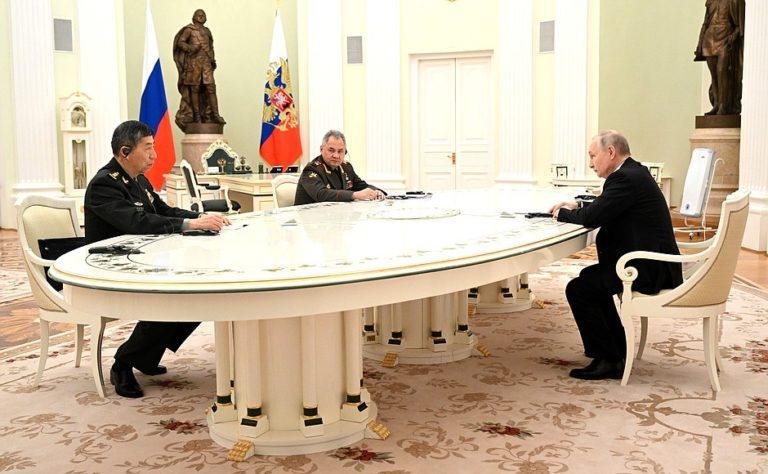Asia-Pacific is Where China-Russia ‘No Limits’ Partnership Will be put to Test

Russian President Vladimir Putin (R) met China’s State Councillor and Defence Minister Li Shangfu (L), Moscow, April 17, 2023
The power dynamic in Northeast Asia is undergoing a dramatic change against the backdrop of the “no limits” strategic partnership between China and Russia. The collapse of Kiev’s counteroffensive” and abject defeat in the war with Russia may compel Biden administration to put “boots on the ground” in western Ukraine, triggering a global confrontation, and, equally, the US-China relations are at their lowest point since their normalisation in the 1970s, while Taiwan issue may potentially turn into a casus belli of war.
To be sure, the Northeast Asian theatre is going to be a crucial arena in the brewing big-power confrontation what with the Arctic hotting up and the Northern Sea Route becoming operational, which will catapult the strategic importance of the Russian Far East and Siberia as the powerhouse of the world economy in the 21st Century combining with its present status as the world’s number one nuclear power.
The outcome of the Ukraine war might be the last chance for the United States to rein in Russia from keeping its tryst with destiny. That is what makes the Far East the most consequential region for the US in its global strategy.
Symptomatic of the cascading tensions, the Russian foreign ministry summoned the Japanese Ambassador on Friday and a protest was lodged in extraordinarily harsh language, as it came to be known that the 100 vehicles that Tokyo innocuously promised last week to Ukraine would in reality be armoured vehicles and all-terrain vehicles. Apparently, Tokyo was dissimulating, since Japan’s export rules ban its companies from selling lethal items overseas!
Tokyo is crossing a “red line” and Moscow is not amused. The foreign ministry statement on Friday “stressed that the administration of Prime Minister Fumio Kishida should be ready to share responsibility for the deaths of civilians, including those in Russia’s border regions… (and) driving bilateral relations even deeper into a dangerous impasse. Such actions cannot remain without serious consequences.”
Significantly, on Friday, in a video conference with General Liu Zhenli, Chief of Staff of the Joint Staff Department of China’s Central Military Commission, the Chief of the General Staff of Russian Armed Forces and First Deputy Minister of Defence General Valery Gerasimov expressed confidence in the expansion of military cooperation between the two countries and noted, “Coordination between Russia and the People’s Republic of China in the international arena has a stabilising effect on the world situation.”
The Chinese media later reported that the two generals agreed that Russia will participate (for the second time) in the Northern/Interaction-2023 exercise organised by China, signalling a new framework of China-Russia joint strategic exercises alongside the joint air patrol over the Sea of Japan and the East China Sea by their strategic bombers. By the way, the sixth such joint air petrol was conducted on Tuesday since the practice began in 2019.
The big picture is that the shift in Japanese policies through the past year — close alignment with the US regarding Ukraine; copying the West’s sanctions against Russia; supply of lethal weapons to Ukraine, etc. — has seriously damaged the Russo-Japanese relationship. On top of it, Japan’s re-militarisation with American support and its growing ties with NATO (which is lurching toward the Asia-Pacific) makes Tokyo a common adversary of both Moscow and Beijing.
The imperative to push back this resurgent US client is strongly felt in Moscow and Beijing, which also has a global dimension since Russia and China are convinced that Japan is acting like a surrogate of American dominance in Asia and is subserving western interests. On its part, in a turnaround, Washington now actively encourages Japan to be an assertive regional power by jettisoning its constitutional limits to rearmament. It pleases Washington that Japan pledged a long-term increase of over 60 percent in defence spending.
What worries Moscow and Beijing is also the ascendance of revanchist elements — vestiges of Japan’s imperial era — in the top echelons of power in the recent period. Of course, Japan continues to be in denial mode as regards its atrocities during the period of its brutal colonisation of China and Korea and the horrific war crimes during World War 2.
This trend bears striking similarity to what is happening in Germany, where too the pro-Nazi elements are reclaiming habitation and a name. Curiously, a German-Japanese axis is present at the core of Washington’s strategies against Russia and China in Eurasia and Northeast Asia.
The German Bundeswehr is expanding its combat exercises in the Indian and Pacific Oceans and will deploy more naval and air force units to the Asia-Pacific region next year. A recent German report noted, “The intensification of German participation in Asian-Pacific regional manoeuvres is taking place at a time when the United States is carrying out record-breaking manoeuvres in Southeast Asia, in its attempts to intensify its control over the region and displace China as much as possible.”
Japan’s motivations are easy to fathom. Apart from Japanese revanchism which fuels the nationalist sentiments, Tokyo is convinced that a settlement with Russia over Kuril Islands is not to be expected now, or possibly ever, which means that a peace treaty will not be possible to bring the World War 2 hostilities to an end formally. Second, Japan no longer visualises Russia to be a “balancer” in its troubled relationship with China.
Third, most important, as Japan sees the rise of China as a political and economic threat, it is rapidly militarising, which in turn creates its own dynamic in terms of both upending its power position in Asia as also integrating itself with the West (“globalising”). Inevitably, this translates as promoting NATO in the Asian power dynamic, something that cuts deep into Russia’s core national security and defence strategies. Consequently, whatever hopes the strategists in Moscow had nurtured in the past that Japan could be weaned away from the US orbit and encouraged to exercise its strategic autonomy have evaporated into thin air.
Arguably, in his zest to integrate Japan into the US-led “collective West”, Prime Minister Kishida overreached himself. He behaves as if he is obliged to be more loyal than the king himself. Thus, on the same day that President Xi Jinping visited Moscow in March, Kishida landed in Kiev from where he went to attend a NATO Summit and openly began lobbying for establishment of a NATO office in Tokyo.
Kishida followed up by hosting NATO Secretary-General Jens Stoltenberg in Tokyo and giving him a platform to berate China publicly from its doorstep. There is no easy explanation for such excessive behaviour. Is it a matter of impetuous behaviour alone or is it a calculated strategy to gain legitimacy for the ascendance of revanchist elements whom Kishida represents in the Japanese power structure?
To be sure, Northeast Asia is a priority now for China and Russia, given their overlapping interests in the region. NATO expansion to Asia and the sharp rise in the US force projection bring home to the defence strategists in Beijing and Moscow that the Sea of Japan is a “communal backyard” for the two countries where their “no limits” strategic partnership ought to be optimal. The Chinese commentators no longer downplay that the Russian-Chinese military ties “serve as a powerful counterbalance to the US’ hegemonic actions.”
It is entirely conceivable that at some point in the near future, China and Russia may begin to view North Korea as a protagonist in their regional alignment. They may no longer feel committed to observing the US-led sanctions against North Korea. Indeed, if that were to happen, a host of possibilities will arise. The Russian-Iranian military ties set the precedent.
MK Bhadrakumar is a former diplomat. He was India’s ambassador to Uzbekistan and Turkey. The views are personal.
Get the latest reports & analysis with people's perspective on Protests, movements & deep analytical videos, discussions of the current affairs in your Telegram app. Subscribe to NewsClick's Telegram channel & get Real-Time updates on stories, as they get published on our website.























